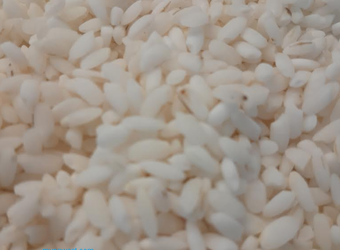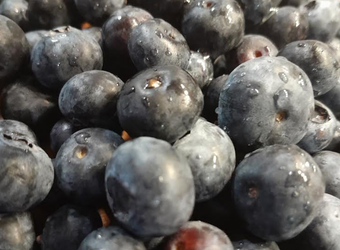Rice is a rich source of carbohydrates
Rice is a staple food for a significant portion of the world's population and offers several health benefits:
1. **Energy Source**: Rice is a rich source of carbohydrates, which are the body's primary source of energy. It provides fuel for the brain and muscles, making it an essential part of a balanced diet.
2. **Nutrient-Rich**: While primarily a source of carbohydrates, rice also contains essential vitamins and minerals, including B vitamins such as thiamine (vitamin B1) and niacin (vitamin B3), as well as minerals like iron and magnesium. These nutrients play vital roles in metabolism, energy production, and overall health.
3. **Low in Fat and Cholesterol**: Rice is naturally low in fat and contains no cholesterol, making it a heart-healthy food choice. Consuming low-fat, cholesterol-free foods like rice can help maintain healthy cholesterol levels and reduce the risk of heart disease.
4. **Gluten-Free**: Rice is naturally gluten-free, making it suitable for individuals with celiac disease or gluten sensitivity. It can be an essential source of carbohydrates for those who need to follow a gluten-free diet.
5. **Easy to Digest**: White rice, in particular, is easily digestible, making it suitable for individuals with sensitive digestive systems or those recovering from illness. It is often recommended during periods of gastrointestinal distress as a bland, easy-to-digest food.
6. **Versatility**: Rice is incredibly versatile and can be incorporated into a wide variety of dishes, including main courses, side dishes, soups, salads, and desserts. It can be flavored and seasoned in numerous ways to suit different cuisines and tastes.
7. **Satiety**: Despite being relatively low in calories, rice can help promote feelings of fullness and satiety due to its fiber content and ability to absorb liquids. This can aid in weight management by reducing overall calorie intake and controlling appetite.
8. **Economical and Accessible**: Rice is a relatively inexpensive and widely available food staple, making it accessible to people of all socioeconomic backgrounds. It serves as a valuable source of nutrition for populations around the world.
While rice offers numerous health benefits, it's essential to consume it as part of a balanced diet that includes a variety of other foods to ensure adequate intake of all essential nutrients. Additionally, choosing whole grain varieties of rice, such as brown rice, provides additional fiber and nutrients compared to refined white rice.
Yes, rice can be a healthy component of a balanced diet when consumed in moderation and as part of a varied and nutritious meal plan. Here are some reasons why rice can be considered a healthy food choice:
1. **Rich in Carbohydrates**: Rice is a significant source of carbohydrates, which are the body's primary source of energy. Carbohydrates provide fuel for the brain, muscles, and other bodily functions, supporting overall energy levels and physical activity.
2. **Low in Fat and Cholesterol**: Rice is naturally low in fat and contains no cholesterol, making it a heart-healthy option. Consuming foods low in saturated and trans fats can help maintain healthy cholesterol levels and reduce the risk of heart disease.
3. **Gluten-Free**: Rice is naturally gluten-free, making it suitable for individuals with celiac disease or gluten intolerance. It serves as an essential carbohydrate source for those who need to follow a gluten-free diet.
4. **Contains Essential Nutrients**: While primarily a source of carbohydrates, rice also contains essential vitamins and minerals, including B vitamins such as thiamine (vitamin B1) and niacin (vitamin B3), as well as minerals like iron and magnesium. These nutrients play vital roles in metabolism, energy production, and overall health.
5. **Easily Digestible**: White rice, in particular, is easily digestible, making it suitable for individuals with sensitive digestive systems or those recovering from illness. It is often recommended during periods of gastrointestinal distress as a bland, easy-to-digest food.
6. **Versatile**: Rice is incredibly versatile and can be incorporated into a wide variety of dishes, including main courses, side dishes, soups, salads, and desserts. It can be flavored and seasoned in numerous ways to suit different cuisines and tastes.
7. **Satiety**: Despite being relatively low in calories, rice can help promote feelings of fullness and satiety due to its fiber content and ability to absorb liquids. This can aid in weight management by reducing overall calorie intake and controlling appetite.
While rice offers several health benefits, it's essential to consume it as part of a balanced diet that includes a variety of other foods to ensure adequate intake of all essential nutrients. Additionally, choosing whole grain varieties of rice, such as brown rice, provides additional fiber and nutrients compared to refined white rice. Moderation is key, as excessive consumption of rice, particularly refined varieties, may contribute to fluctuations in blood sugar levels.







Related Articles